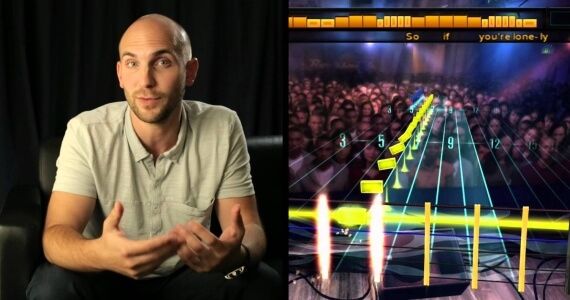There's just no other way of stating it: the heights of the music game genre seem to have passed, with Guitar Hero lost to the ages, and even Rock Band seeming more and more like a form of gameplay whose best days lie behind it. Given those facts, we have to ask: what do the developers of Rocksmith 2014 know that we don't?
We got the chance to visit with the developers and find out the team's intentions ourselves. After leaving, it seems that Rocksmith 2014's impact will be felt by more than just gamers.
For those who may have missed the franchise's first installment, the original Rocksmith represented Ubisoft's foray into the music game genre, with an outspoken commitment to actual instruction. Where other music games gave players the feeling of playing an instrument, Rocksmith set out to actually teach them how - with a real guitar.
Take a step off the sun-baked streets of San Francisco and into the offices of the minds behind Rocksmith 2014, and most people will expect to find a shrine to rock and roll, with a soundtrack of Page, Hendrix or Allman solos heightening the atmosphere. That might seem like an exaggeration, but this is a development team who are steadfast in their love of guitar (while most other publishers have at least grudgingly accepted that the 'music game genre' is in the midst of a recession).
What you will actually find is a quiet office space giving the distinct impression that those present are, surprisingly, not playing around. The only real sign that creativity is in full swing is the hurried conversations carried out in hushed voices as half a dozen designers huddle around a monitor; the only sign that music is, against appearances, being made being the guitars leaning against nearly ever visible workspace.
As the idea of a 'music game' has radically changed over the course of a few years, this development team is betting big on their unique approach to an instructional guitar-based video game-- scratch that: an instructional piece of learning software.
To plant a flag in such shifting sands takes confidence, and much of the studio's confidence can be credited to creative director Paul Cross, - the one-time Criterion employee (makers of the Burnout series) who traded asphalt for axes when he joined the team for the original Rocksmith. In our time at the studio, the Brit's enthusiasm and easy humor did a great deal to explain why Ubisoft would double down after the original failed to reach the levels of a 'smash success.'
Cross admits that many members of the media he speaks with have never actually played Rocksmith - a game he describes (with a wry smile) as "a 7 out of 10, with maybe an extra point for innovation" - which might lead you to believe that listing the team's improvements would become something of a chore. But if the long odds are adding pressure to the studio's work, it doesn't show.
Much of our time was spent witnessing the undisputed showpiece of Rocksmith 2014: Session Mode, a veritable dream come true for any basement guitar god who dreams of endless jam sessions. The new mode owes its creation to the team's desire - led by Audio Designer Nicholas Bonardi - to make the process of mastering the guitar one that players would enjoy, not simply endure.
The answer, of course, was a band for the player to lead. But getting from that idea to the finished product has proven to be a true test of fine-tuning, and blazing more than a few trails:
"So Nick had the idea: 'what if we added an AI? What if we made this drum machine think? What if we made an artificial intelligence that played drums?' So we were like 'okay, that's pretty cool.' Well, what if they played other instruments as well?... We even simulate the natural slip away from the perfect beat that happens with all but the most robotic of musicians.
"Because the band is AI, they think about things that they want to do. So they drive changes in the music; they're going to push you to solo, they're going to change up the keys, going to change up where you're playing, how you're playing. Not only are they reacting to what you're doing, but you're going to start reacting to what they do. You develop this two-way communication - it's why we say it's a simulation of a live jamming experience, not a standard backing track."
Once players have begun to grasp the finer points of Session Mode, they're free to tweak the experience with more settings than could possibly be named here. Tempo, instrument types, setting, acoustics - the band becomes the exact one the player wishes to shape. Want to re-experience the sounds of a grunge band played in a closed garage? The settings to make it possible are all present. If the sudden urge to play some blues in a full-scale concert hall strikes, settings can be changed on the fly, without having to drop out of the mode and reload.
Bonardi explains the new gameplay mode in the trailer below:
[HTML1]
It's this Session Mode that the developers claim has been a particular hit with experienced musicians; Jerry Cantrell, lead guitarist of Alice in Chains, for one. It was Cantrell who gave a firsthand demonstration of Rocksmith 2014 when the game was officially unveiled at E3 2013, but Cross muses on the musician's affection for the mode extending into the downtime between behind-closed-doors demos in the days that followed.
But while all eyes and ears in our demo were locked on the software's ability to keep pace, support, and push the human guitarist, the smile on Cross' face makes it clear that the stunned 'oohs' and 'ahh's (and palpable jealousy of everyone not holding the guitar) aren't lost on the team members. Yet teaching anyone to play guitar isn't the team's ultimate goal; they hope to let players experience making music for themselves, and understand how a collection of musicians (digital or otherwise) can become a creative outlet.
To those who doubt the game's potential, Cross offers himself as a prime example of its effectiveness:
"Three years ago when I started working on Rocksmith, I'd never played a guitar at all. AT ALL. People would talk about improvising, I'd be like 'there's no way I'm going to be able to improvise.' And I've gotten to the point now where I'll stick it in the blues scales, I'll set up my band, and just kind of play along. Because I've played songs; I've played along with stuff, I have the ideas of the patterns, and my fingers kind of know what to do.
"Now I've got the motivation to go with it, because I get achievements. I have goals to go and tick off. As a gamer, born and bred, you know... give me some things to tick and I'll learn how to do whatever it was I had to do to tick them. And that's kind of the magic."
When the game's Session Mode is shown in detail and explained, the addition of AI band members to a single guitarist seems like a no-brainer. But Bonardi explains that while Rocksmith 2014 may be seen by many as a video game, the developers know that they are attempting to do more than just resurrect, or re-imagine the music game genre:
"This doesn't exist anywhere right now. This doesn't exist in the video game space, it doesn't exist in the music game space, or in the music space. This is a pretty revolutionary thing for music in general. To be able to have an artificially intelligent band that's going to follow you and play along with you.
"What was really important about Rocksmith 1 is it actually taught people how to learn. 95% of people who played Rocksmith said that they actually got better and wanted to learn more from it. That was why we immediately got started on the next one, as far as fixing our mistakes."
Fixing their mistakes is theme repeated by both Cross and Bonardi, who explain that much of the team's work is simply advancing ideas that few outside the studio ever recognized - the Session Mode, for instance, described as "something nobody asked for." But the innovation is already being noted by industry experts. Keeping the AI from hitting each and every beat perfectly on time, as mentioned above - dubbed 'Tempo Slew' - is something Bonardi points out as troublesome for audiophiles who think 'artificial' should mean 'unnatural.'
As the game's marketing has highlighted, the team's experimentation and commitment is already attracting attention from groups and individuals not usually included in the 'gamer' audience, proving that the potential of 'learning software' has never been higher than today:
[HTML2]
It's hard to say if Rocksmith 2014 will reach a larger audience than its predecessor, but as the video game industry moves closer and closer to bigger, more cinematic experiences, Ubisoft is exploring a very different purpose: the medium's ability to teach. After all, just about anyone could learn to play the guitar; it's the studio's hope that they can make the experience easier, more enjoyable, and in the end, turn an entirely new group of people into budding musicians.
Oh, and it's also a video game.
_____
Rocksmith 2014 will be available October 22, 2013 for Mac, PC, PS3 and Xbox 360.
Follow Andrew on Twitter @andrew_dyce.


